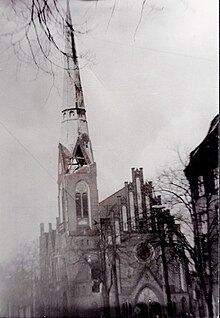You can help expand this article with text translated from the corresponding article in German. (February 2020) Click [show] for important translation instructions.
|
Cyclone Quimburga, also referred to as the Lower Saxony Storm,[5] was a deadly European windstorm that struck northern and central Europe between 12 and 14 November, 1972.[1] The storm has been described as one of the most devastating storm events during the 20th century.[5]
| Type | European windstorm Extratropical cyclone |
|---|---|
| Formed | 11 November 1972[1] |
| Dissipated | Unknown |
| Highest gust | 245 km/h (152 mph)[1] |
| Lowest pressure | 953 hPa (28.1 inHg)[2] |
| Fatalities | 54[3][4] |
| Areas affected | Newfoundland, British Isles, France, Germany, Netherlands, Belgium, Italy, Switzerland, Austria, Denmark, Poland |
The storm developed over the UK where it caused some localised damage in the south before moving across the North Sea where it underwent explosive cyclogenesis dropping from 969 hPa to 953 hPa.[6] This development was fueled by the contrast between cold air in the parent low and the warm water of the North Sea.[6] The storm brought wind gusts of over 35 metres per second (130 km/h) to large areas of the Netherlands, with gusts over 40 m/s (140 km/h) across northern Germany.[6] The greatest damage was reported across the German state of Lower Saxony, after which it is known in German as the Lower Saxony storm.[6]
The storm destroyed the Königs Wusterhausen Central Tower, a 243 m (797 ft) communications tower to the southwest of Berlin [7] and the church steeple in Berlin-Friedrichshagen.

The courtyard of the Royal Netherlands Meteorological Institute headquarters in De Bilt features a representation of the pressure map of the Quimburga storm.[8]
References
edit- ^ a b c "Niedersachsen-Orkan 1972". Saevert. Retrieved 12 February 2012.
- ^ "De storm van 13 november 1972" (PDF) (in Dutch). KNMI. Retrieved 19 March 2012.
- ^ "54 Dead as Gale Winds Rake Europe, British Isles". The Milwaukee Sentinel. 14 November 1972. Retrieved 12 February 2012.[permanent dead link]
- ^ "Storm 1972" (in Dutch). meteotuitjenhorn. Archived from the original on 21 May 2012. Retrieved 19 March 2012.
- ^ a b Donat, Markus G.; Gregor C. Leckebusch; Simon Wild; Uwe Ulbrich (9 December 2010). "Benefits and limitations of regional multi-model ensembles for storm loss estimations" (PDF). Climate Research. 44 (2–3): 211–225. Bibcode:2010ClRes..44..211D. doi:10.3354/cr00891. Retrieved 19 March 2012.
- ^ a b c d Holland, Peter (30 November 2017). "Starting with a Bang: Autumn Windstorms in Europe". www.rms.com. RMS Blog. Retrieved 28 November 2017.
- ^ "Mittelturm Königs Wusterhausen". skyscraperpage.com. Retrieved 19 March 2012.
- ^ "Virtual tour: Look around at KNMI". KNMI. Archived from the original on 19 January 2013. Retrieved 5 February 2013.
External links
editMedia related to Quimburga (storm) at Wikimedia Commons